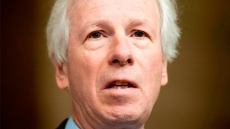TORONTO — An Ontario university professor who has applied for permanent residency in Canada is facing the prospect of having to leave the country because his son has Down Syndrome.
Citizenship and Immigration Canada has told Felipe Montoya that his son's condition makes him inadmissible to Canada because of the potential burden the child would place on the health care system.
Immigration lawyers say that when a whole family applies for residency, a finding of inadmissibility against one of its members winds up applying to everyone on the application.
Montoya takes exception to CIC's ruling, saying his 13-year-old son is currently making use of the same publicly available resources as his daughter, who does not have a disability.
He also questions CIC's calculation of how much money his son could cost Canadian taxpayers, adding that he and his wife have been among those taxpayers since arriving in the country four years ago.
CIC said it could not comment on the specific case, which Montoya says has potential implications for families besides his own.
"We consider it to be in contradiction to the charter for many reasons, and we think that it's based on outdated views of so-called disabilities and that it needs to be looked at again and brought up to date," Montoya said in a telephone interview.
The family's saga began when Montoya moved to Canada from his native Costa Rica to take up a position at Toronto's York University. He remains on staff there as a full-time, tenured professor of environmental studies.
Three years ago, Montoya filed an application for permanent residency for himself, his wife and his two children.
The fact that his son Nicolas had Down Syndrome was disclosed at the outset and confirmed by doctors the family visited for the medical exams required for the application process. Montoya said Nicolas, along with all the rest of the family, was found to be perfectly healthy.
Montoya hoped the medical clearance would help finalize his application, but a letter from CIC told a different story.

"I have determined that your family member Nicolas Montoya is a person whose health condition might reasonably be expected to cause excessive demand on social services in Canada," reads a letter sent to Montoya. "An excessive demand is a demand for which the anticipated costs exceed the average Canadian per capita health and social services costs, which is currently set at $6,387."
The CIC letter references reports that Nicolas functions at the level of a three-year-old. It goes on to estimate that special education supports for Nicolas would cost between $20,000 and $25,000 a year, a finding Montoya questions.
He said CIC provided no detailed breakdown of how the estimate was reached, adding that his son did not require special accommodations because he joined a pre-existing community classroom in his local public school.
"There were no extra provisions for him. He joined a classroom just like my daughter did," Montoya said. "My daughter is not deemed inadmissible because of her use of state services, yet Nico is."
Cases like Montoya's are surprisingly common, according to Toronto immigration lawyer Henry Chang.
Canada's current immigration laws around family members with chronic conditions, are very strict, he said, adding the sweeping rules can even apply to people who are not physically living in Canada.
"Let's say you have a child who's in university in the United States who isn't going to be immigrating to Canada with the rest of the family, but they have cancer and they're having treatment right now. That could theoretically result in a whole family being barred for medical grounds," Chang said. "It sounds crazy. If you're not an immigration lawyer, there's no logic to this."
Chang said the Montoyas still have a few strategies available to them if they want to fight the finding. They can file documents challenging CIC's calculations of Nicolas' financial needs or appeal on humanitarian grounds.
They could also present evidence that they're able and willing to shoulder some of Nicolas' prospective costs themselves, a move Montoya likens to being asked to pay twice for the same service since he's already paying tax.
Montoya said the family is braced for a number of outcomes, including the possibility that they will have to return to Costa Rica.

In the meantime, however, he hopes his family's situation will raise questions about the ways in which society views certain disabilities.
"There's no facts that establish that he will cost the state anything. The only fact I imagine that they are basing it on is this idea ... that Down Syndrome people are all sick and require intensive care," he said. "This is a stigma, and it's not based on the individual case."





